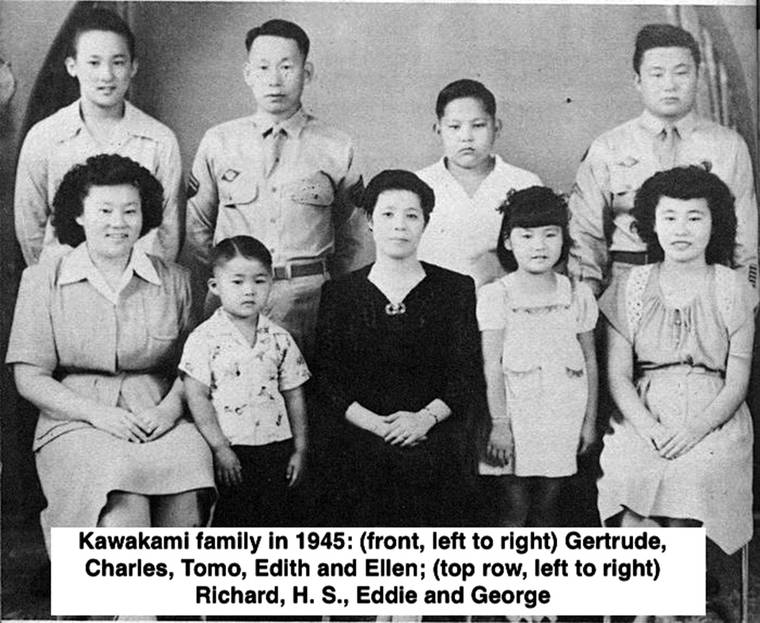Following H.S. (Harvey Saburo) Kawakami’s arrival on Kaua‘i from Japan in Oct. 1912 to join his older brother, Fukutaro, and his father, Fukujiro, at Port Allen, Fukutaro enrolled him at ‘Ele‘ele School to learn English, and in Sept. 1913, Fukutaro sent H.S. to study at Mid-Pacific Institute on O‘ahu.
After graduating in 1922, H. S. joined Makaweli (later Olokele) Plantation as a store clerk and settled down to married life in a plantation house at Camp One with his wife, Tomo Kawakami, with whom he would have seven children.
But, he gradually became dissatisfied with a plantation hierarchy that placed Asians, with rare exception, in the lowest echelon.
Makaweli’s Japanese, Okinawan, Chinese and Filipino laborers, along with their families, lived in camps containing hundreds of small, packed-together houses constructed of rough 1×12-foot boards, one family to a house, with single men sharing a house.
While opposite Camp One there stood several dozen roomier houses with yards for supervisors, who were predominantly Portuguese.
And, above the plantation store, along a paved, tree-lined street, stood about 20, white-framed houses reserved for managers — all of whom were Caucasians.
H.S. set his sights on independence, learned the store trade and saved, and in 1926 he quit the plantation to open his own store in a rented building by the old Waimea Landing.
Later, in 1937, his friend, rancher and politician Charles Rice, sold him property in Lihu‘e to build a dry-goods and furniture store, and H.S. Kawakami Store, like the old Kress Store next door, became a Lihu‘e landmark for decades.
H.S. served in the Army during World War II while in his forties, and while stationed on the mainland, he became a United States citizen.
After the war, H.S. moved his Waimea store from Waimea Landing to downtown Waimea.
A few years after Tomo died in 1955, H.S. married Elsie Kawakami.
The business that H.S. founded at Waimea in 1926 eventually grew to include several Big Save Markets, gift shops, service stations and convenience stores, with a payroll of about 400 employees.






And…1926 and 400 employees, what happened next in this success and hard work story, and the descendants, our Mayor?
Please continue?
Relation to the mayor?
You forgot to mention that, two generations later, a grandchild was born into this wealth and privilege. His name is Derek Kawakami. He’s never worked a real job a day in his life, he’s never struggled, and he was raised and educated totally isolated from the “lower class” of Kauai residents.
With the help of his ridiculously rich family and friends, he literally bought an election that made him our mayor, and now he does the bidding of other elites, working toward turning Kauai into one giant corporate-owned property.
Under Kawakami’s reign, Kauai’s rich get richer, and the poor have their land stolen from them.
They used to own Big Save store. How many people on this blog used to work for Big Save store in high school? Well if you were one of them, you knew the routine. Wait one month before you get paid. Cut your pay in half because of standing around and nothing to do. Wait several months after before that pay gets placed on your check again. And work some week in a row or days in a row non stop for 10 days straight. Then you get off again. And watch for the pay. It comes in sporadic until finally it is all accounted for. What strange business they have? That’s small business for you.
Strolling down memory lane….. I remember that kids in Kapaa school thought (were taught) Filipino were Spanish, Portuguese were Caucasian, Haole were evil and Japanese ran everything…..
Umm, helllooo, there are other factions and family members to the Kawakami family, not just H.S. and his clan. If you’re going to write an island history piece make sure to include the whole family. smh.
This and other GI “Island History” articles reminds me of Charlie Rice. Although born and formal schooled in Honolulu I consider Kaua’i as my home island. I was raised at Moloa’a Beach and am of the Huddy family.
Look forward to your articles with much aloha. Mahalo piha.